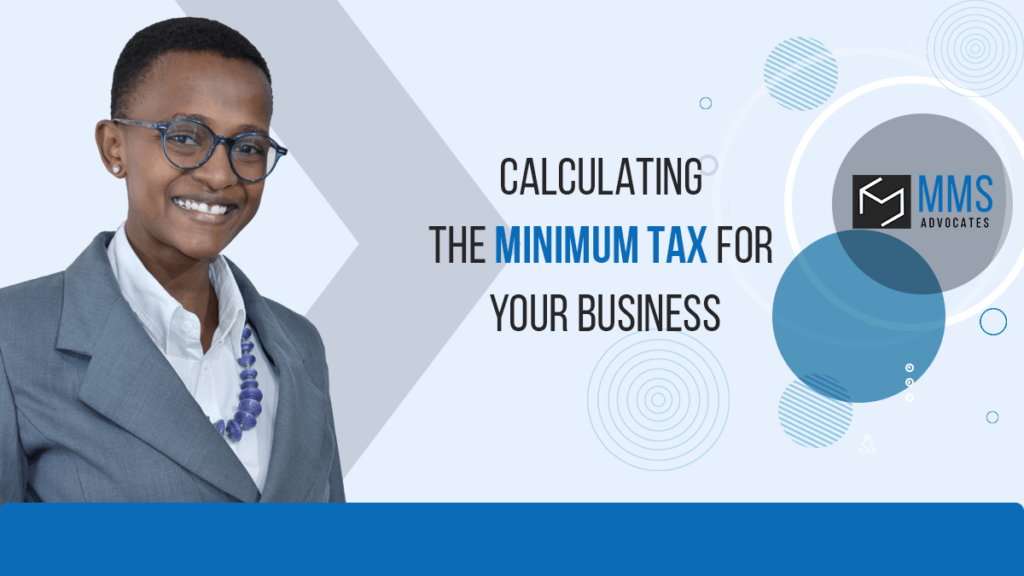
Assuming that a business’ financial year starts in January, the first tax quarter for payment of taxes from business income is coming to an end. Businesses will get to apply the minimum tax provisions that came into force on 1st January 2021 in calculating how much tax to remit to KRA. KRA has clarified that the minimum tax applies to individuals, companies, partnerships, limited liability partnerships, association of persons or trusts.
This article intends to provide useful guidance on how to calculate minimum tax payable in order to help business to figure out the amount of tax payable from their business income for this quarter going forward.
The minimum tax is the base income tax payable by any business whether profitable, loss making, new or old. It is payable when the amount of a taxpayer’s installment tax payable is less than the amount of minimum tax. The minimum tax is 1% of the gross turnover of the business. This means that from now on, businesses will have to calculate the minimum tax and compare it with the old existing 30% business tax calculations and pay the higher tax.
To understand this better, a brief explanation of how KRA collects business taxes is useful. KRA collects these taxes in advance by requiring business to pre-pay taxes in four equal installments based on projected taxes calculated at the beginning of a business’ financial year. The installment payments should be paid by the 20th day of the 4th, 6th, 9th and 12th month of a business’ financial year. If a business’ financial year starts in January, then the business should pay their tax installment by the 20th of April (for the first quarter being January, February and March), 20th of June (for the second quarter being April and May), 20th of September (for the third quarter being June, July and August) and 20th of December (for the fourth quarter being September, October, November and December). The business should then close its books and calculate the tax payable based on the actual earnings less expenses and tax deductibles. It then reconciles the amount of tax paid in advance and the tax that was actually payable. If tax paid was in excess, then the business will have a tax credit that it can offset against its tax liabilities in the next financial year. If the tax paid in advance is less, then the business is required to pay the difference by the 4th month following its year end. As you will note from this, a company with a loss-making track record could avoid paying taxes or pay low taxes because it could claim a bleak financial year ahead.
Similarly, a new company with no past revenues could also avoid paying taxes or pay very little based on conservative projections. With the minimum tax, KRA has mirrored the same installment requirements. However, for minimum tax, the tax installments will not be calculated based on projected taxes or the previous year’s taxes but based on actual gross revenues during the quarter. Taking the same example above, a business with a year start of January would have to sum up the actual revenues or income earned in January, February and March and multiply by 1% to get the minimum tax payable for that tax quarter.
In knowing which amount is payable in a respective tax quarter, between the relevant tax installment calculated as above and the minimum tax, the business is supposed to compare the two and pay the one with the higher amount. Similar provisions on tax reconciliations are available for minimum tax at the end of the business’ financial year. Please note that for businesses without a December financial year end date, the minimum tax becomes payable from the next quarter after 1st January 2021 when its next installment tax becomes due and payable.
Minimum tax is not applicable to:
• Employment income;
• residential rental income;
• capital gains tax;
• income the extractives sector;
• income that is subject to withholding tax including digital services tax provided that at the end of the accounting period the tax payable on taxable income exceeds the minimum tax payable;
• income of a person engaged in insurance business;
• income of a person engaged in a business whose retail price is regulated by the Government; and
• income that is exempt from tax
We await to see how this pans out practically in April and will update this note in case of any new developments. Should you have any queries on minimum tax, please contact Felicia Solomon at felicia@mmsadvocates.co.ke or Andrew Wanga at Andrew.mmsadvocates.co.ke.